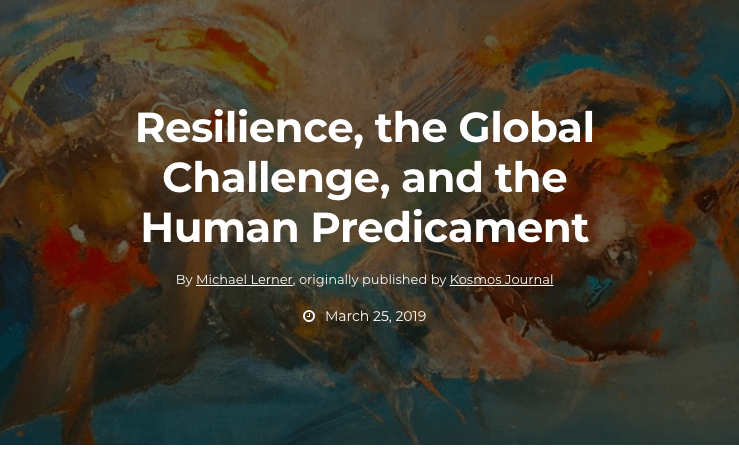Item Link: Access the Resource
Date of Publication: March 25, 2019
Author(s): Michael Lerner
Newspaper: Kosmos
By Michael Lerner, originally published by Kosmos Journal. Reprinted in Resilience.
We face a perfect storm of environmental, social, technological, economic, geopolitical and other global stressors. These global stressors interact in unpredictable ways. The pace of future shocks is increasing. The prospect for civilizational collapse is real. We need to build meaningful resilience.
There are four questions about how to build resilience:
1. How do we prepare ourselves and those we love?
2. How do we prepare our communities, networks, tribes, and organizations?
3. How do we prepare our states, countries, and international communities?
4. How do we prepare at a global level?
This human predicament goes by many names. The global challenge. The global problematique. Limits to growth. The end of the world as we know it. The prospect for civilizational collapse. All refer to the perfect storm of global biosphere and societal stressors interacting in complex and unpredictable ways.
Environmental stressors include:
– Climate change, sea-level rise, and changing weather
– Biodiversity loss at 10,000 times the normal level
– Toxification of all life, insect armageddon
– Ocean acidification, dead zones, plastics, and fish and plankton depletion
– Declining and polluted fresh water sources
– Depleted top soils
– Vanishing forests and many moreSocial stressors include:
– Poverty, racism, and injustice
– Unsustainable economic growth and global debt
– Vulnerable financial systems, supply chains, and power grids
– Population overshoot, refugee migrations, and resource competition
– Uncontrolled technologies, including AI, biotech, nanotech, robotics, cyber threats
– Dysfunctional geopolitics, failing states, and outdated institutions
– War, terrorism, and nuclear threats—defense resources needed elsewhere, and more
Climate change is the greatest global stressor. But a single focus on climate change means other global stressors are underestimated. These stressors interact as force multipliers, increasing unpredictable future shocks and even potential civilizational collapse.
Most people don’t want to think about this. Yet the culture is filled with vivid imaginings of dystopias in books, films, television series, and games. Civilizational collapse lurks at the imaginal edge of collective consciousness. Yet mainstream media and “official” government institutions are largely silent.
People give four excellent reasons for not thinking about the human predicament.
1. It’s overwhelming.
2. I don’t see how to make a difference.
3. I want to focus on things I can change.
4. I have more immediate things to think about.
We won’t argue. We understand. Worry about this can be a poor use of psychic energy for people who barely get by day-to-day—or simply have other priorities.
Likewise, most institutions—governments, corporations, international institutions, and civil society organizations—avoid thinking about our predicament.
They don’t see how they can respond.
They focus on critical sectoral questions.
They ignore future shocks in their planning
They don’t prepare for the high probability of devastating future shocks.
We understand. But we do need a small critical mass of people and organizations who recognize the need to think about our dilemma. The reason is simple. If we prepare, we stand a better chance of surviving than if we don’t. We need to survive these future shocks—up to and including civilizational collapse—if we are to build a greener and more just world on the other side.
Read the complete article here.
The views and opinions expressed through the MAHB Website are those of the contributing authors and do not necessarily reflect an official position of the MAHB. The MAHB aims to share a range of perspectives and welcomes the discussions that they prompt.
